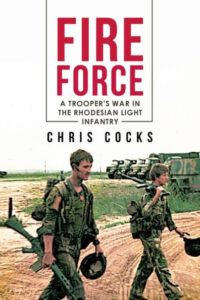Books Published By Lime Tree Press
Subtitle: A Trooper's War in the Rhodesian Light Infantry
Summary: Fire Force is the account of Chris Cocks’s service in 3 Commando, The Rhodesian Light Infantry ( RLI), during Zimbabwe’s civil war of the 1970s—a war that came to be known, almost innocuously, as ‘the bush war’. Fire Force, a tactic of total airborne/airmobile envelopment, was developed by the RLI, and became the principal strike weapon of the beleaguered Rhodesian forces in their struggle against the tide of the communist-trained and -equipped ZANLA and ZIPRA guerrillas. “Like Reitz’s work, Commando: A Boer Journal of the Boer War, Fire Force, by first-time author Chris Cocks, is a personal account of close-quarter warfare. It is a unique, compelling, sometimes brutal account of a young conscript’s three years of service in the elite Rhodesian Light Infantry … Cocks’s work is one of the very few books which adequately describes the horrors of war in Africa … Fire Force is the best book on the Rhodesian War that I have read.” Southern African Review of Books “Fire Force will be to the Rhodesian War what Remarque’s All Quiet on The Western Front was to World War I. A high claim indeed, but perhaps valid, for this moving book is a classic in any sense.” The Star “The narrative is raw … it gives the book a veracity so complete that it will transport anyone involved in the ordeal back across the years with the force of a body blow … Rhodesia does at last have its own version of Michael Herr’s Vietnam experiences, Dispatches. A sense of regret is what really lingers, that the whole nightmare had to happen at all. The list of names of boys killed, or scarred physically and mentally, is moving beyond mere words.” The Financial Mail “The lessons of the past have a relevance to the needs of the present.” —Charles D. Melson, Chief Historian, USMC Fresh faced, liberal, anti-war and barely 18 years old, Chris Cocks couldn’t know that in 1976, by sparing his parents the shame of their son deserting, he would become a member of 3 Commando, The Rhodesian Light Infantry, the elite, now world-renowned regiment and expert proponent of the highly developed and deadly military concept: Fire Force. Outnumbered and forced to use antiquated matériel, especially on the part of the air force, this small defence force showed what can be done with ingenuity, creativity and raw courage. From the first shambolic contact in 1966 the Rhodesians honed and fine-tuned their tactics to the degree where Mugabe’s ZANLA generals admitted at the 1979 ceasefire that they would not have survived another year in the field against the Rhodesians. Fire Force is the rapid, vertical envelopment of an enemy, an encirclement of him, entirely and very quickly, using small, lightly equipped, highly mobile units deployed by helicopter and later as paratroopers. In the international airborne community they are revered: it was not uncommon for a trooper to jump into combat twice a day. Fire Force, spearheading the unseen roles of the Selous Scouts, Special Branch and many others, is succinctly described: it is so simple in its brilliance that it will leave you wondering why it has been left in the 1970s. From command and control, to armament, to the more conventional yet equally critical aspects of soldiering—patrols, ambushes, observation posts and intelligence-gathering—he will hold you enrapt: you will smell the African bush and the cordite. On the personal level, an enemy kill ratio of 80:1 countered by a 40 per cent casualty rate, extended bush rotations, scant R&R and the resultant mental, physical and emotional toll of being a part of this potent “killing machine”, cannot leave a mind free of what the eye has seen or the body unburdened by the stress it has endured year in and out. Chris Cocks takes you on an emotional journey through his war, his four and half years of continual combat, mostly at point-blank range. His story is universal—that of any combat soldier whose only human experience is war and death—and his life thereafter mirrors that of many, yet the point at which he now finds himself is simultaneously humbling and magnificent.

